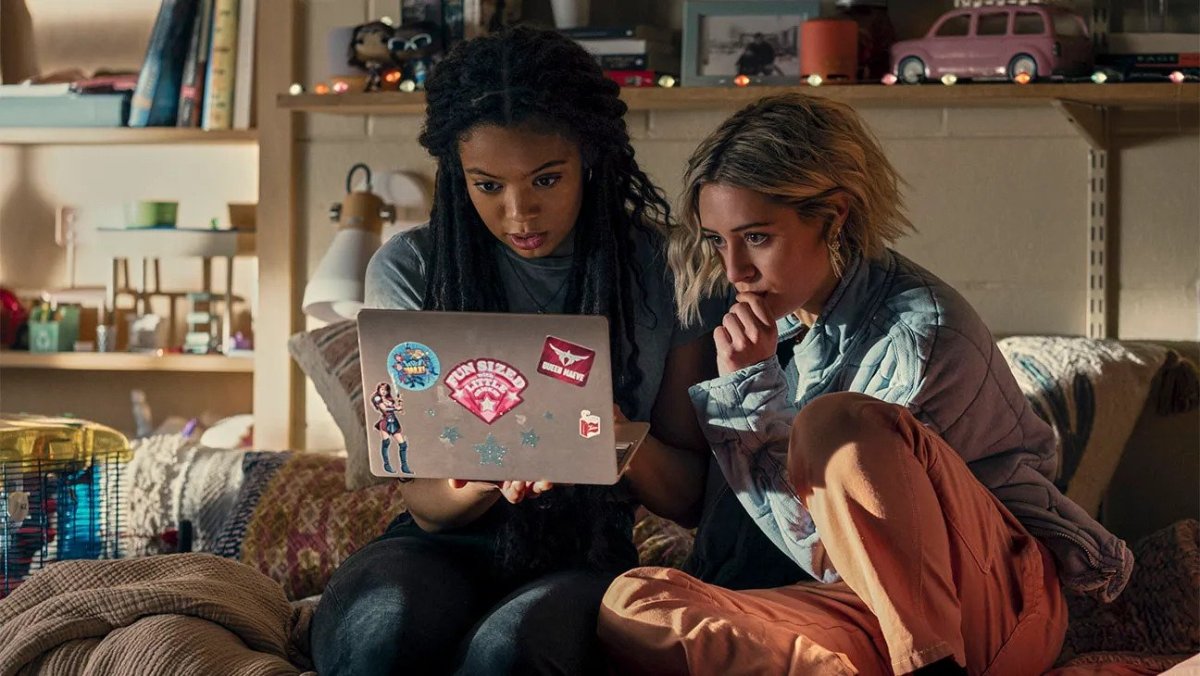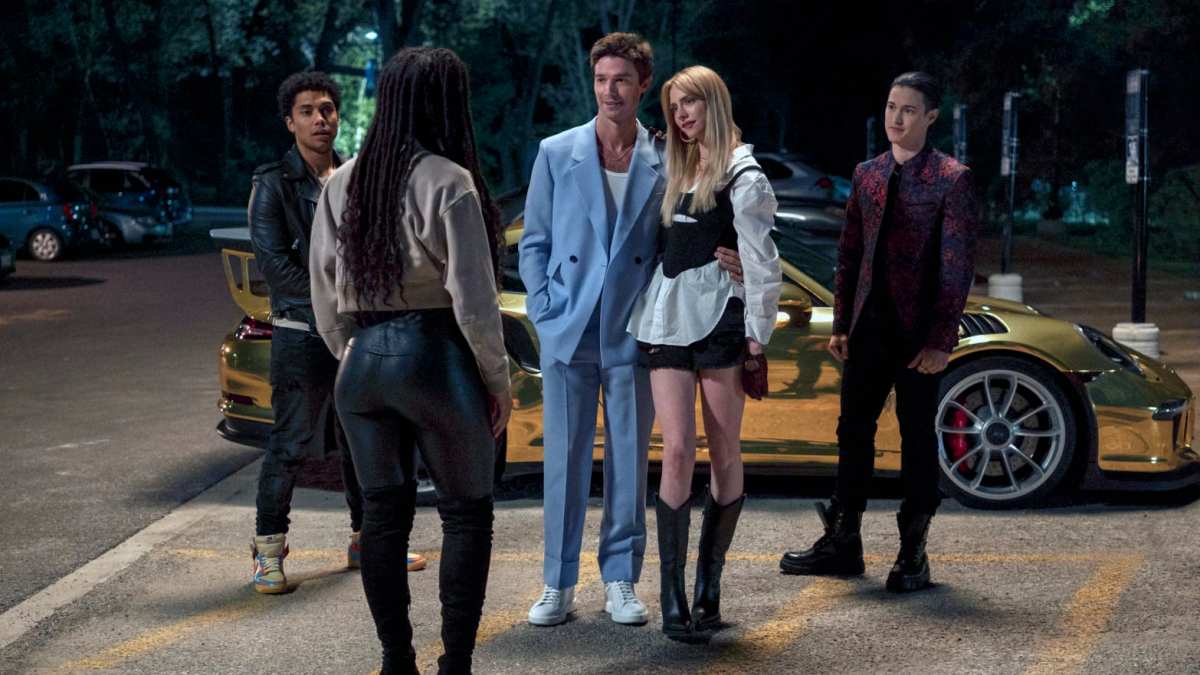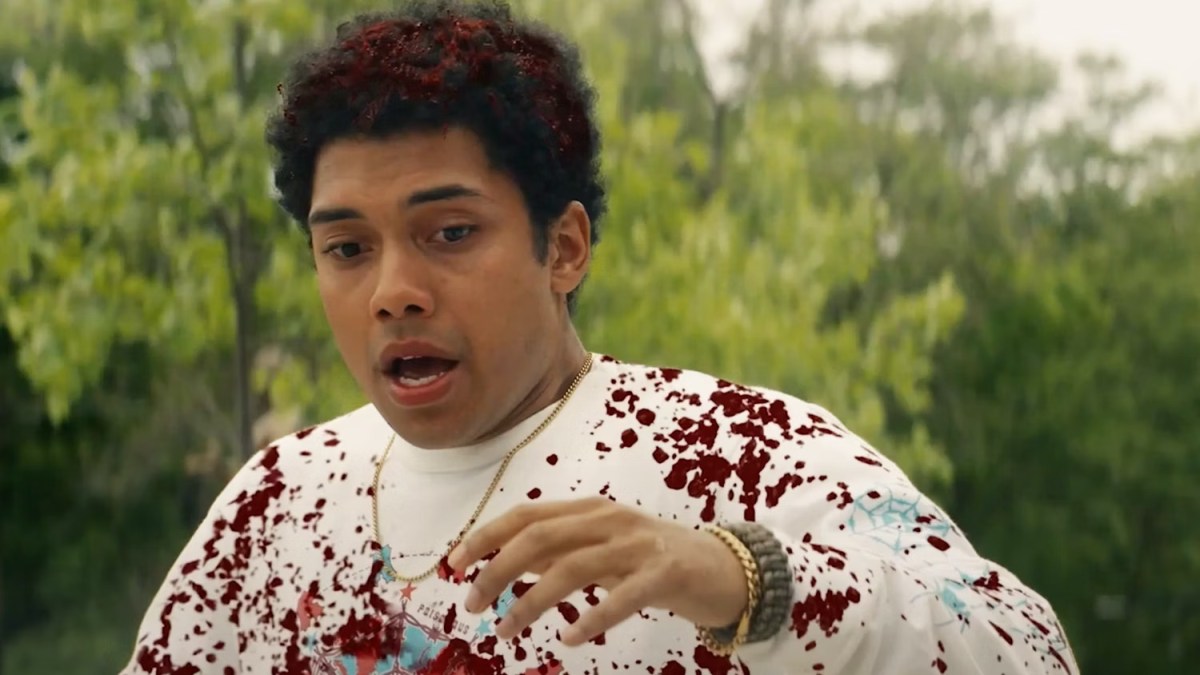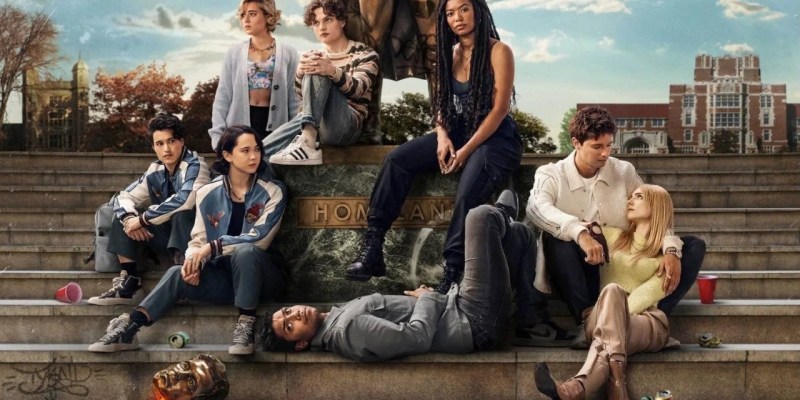This recap and review contains minor spoilers for the first three episodes of The Boys spin-off Gen V, now streaming on Amazon Prime Video.
The first season of Gen V begins with a familiar scene.
It is a seemingly normal evening for a seemingly normal family. However, the eldest daughter (Jaeda LeBlanc) starts to feel a little strange. She rushes up to the bathroom. She is experiencing her first period. However, there is something more than that. Reflexively, she begins controlling the blood, making it flow through the air. Understandably, she freaks out. This causes a panic in the household. Her mother (Miatta Ade Lebile) breaks into the bathroom to investigate what is going on.
In a panic, without any thought, the young girl sends the blood flying, piercing her mother’s neck. As her mother lies bleeding out on the bathroom floor, her father (Ty Barnett) rushes in. He screams and shouts as his wife bleeds out on the floor. This does not help matters. Freaking out, the young girl’s power kicks into overdrive. Her mother’s body explodes, spraying blood everywhere. It punctures her father like a pin cushion. This is the audience’s introduction to Marie Moreau.
This is a fairly standard superhero scene. It is arguably a riff on one of the iconic and defining scenes of the modern superhero genre. It recalls the introduction of another Marie (Anna Paquin) in Bryan Singer’s X-Men. In an early scene in that movie, Marie is introduced as a teenage girl whose dangerous superpowers manifest during a standard coming of age ritual. Making out with her boyfriend (Shawn Roberts), Marie suddenly starts draining the life from him. She freaks out.
The Boys has always owed a lot to the Marvel Cinematic Universe (the MCU) and the wave of superhero films that followed. This is obvious even in these opening three episodes. Director Adam Bourke’s (P.J. Byrne) fall to theater teacher after directing in-universe film Dawn of the Seven is framed in such a way as to evoke Avengers and Justice League director Joss Whedon’s fall from grace. Justine Garcia’s (Maia Jae Bastidas) account of working on “a meditation on grief told through 70 years of sitcoms” suggests WandaVision.
However, even in these opening three episodes, Gen V seems to be drawing more heavily from the tropes and conventions of the populist superhero blockbusters that preceded Iron Man. Marie’s introduction is an archetypal X-Men story beat, a child whose superpowers manifest at puberty in such a way as to alienate them from any of their peers. Given that Gen V is the story of Godolkin University – “God U,” for short – it makes sense for the franchise to lean into those comparisons.

It might be difficult for modern fans to imagine, but there was a time when X-Men was a much bigger brand than The Avengers. The comic was Marvel’s top seller “throughout the 1980s.” Chris Claremont and Jim Lee’s X-Men #1 is still the best selling single edition comic ever. On television, X-Men: The Animated Series demonstrated that Marvel “had commercial value far beyond what anybody estimated.” X-Men is one of the prototypes for the modern multimedia superhero brand.
As such, Gen V really does feel like it is going “back to school” in terms of genre conventions. If nothing else, it harks back to a simpler and more straightforward take on superhero archetypes than those found in its parent series. It is also perhaps a way for the show to sand off the rougher edges of The Boys. These three episodes feature no shortage of “out there” imagery, including a “relatively” giant penis and an impromptu aural lobotomy, but they are also decidedly less ambiguous in their moral framework.
This approach makes sense as a way for Gen V to differentiate itself from The Boys. This is a challenge that faces every spin-off — defining its own identity rather than simply trying to serve as an inferior copy of a successful original. Gen V walks a very fine line in this regard. It is clear that Amazon is aware that it has a potential mega-franchise on its hand, and so Gen V is tasked with threading the fine line of tying into The Boys and forging its own path ahead.
These opening three episodes are saturated with cameos from existing Boys characters. The show’s introductory sequence includes both A-Train (Jessie T. Usher) and Madelyn Stillwell (Elisabeth Shue). The second episode opens with Ashley Barrett (Colby Minifie) on a conference call and features a guest lecture from Bourke. The Deep (Chace Crawford) makes a pre-recorded appearance at the funeral of Richard “Brink” Brinkerhoff (Clancy Brown).
Interestingly, none of these cameos are especially plot relevant. This isn’t like Captain Picard (Patrick Stewart) showing up in the premiere of Star Trek: Deep Space Nine. Many of these appearances could be substituted or rewritten at short notice, even cut from the episode, with minimal impact. Arguably the most significant cameo is that of A-Train, with Marie’s father noting that he’s “the first Black man in the Seven,” setting up Marie’s desire to be “the first Black woman in the Seven.”

However, they do create a strong sense of continuity between The Boys and Gen V, along with throwaway dialogue about Starlight (Erin Moriarty) leaving the Seven or a brief news report concerning the ongoing trials and tribulations of Homelander (Antony Starr). It’s clear that this is part of the same world. Even beyond the cameos, these three episodes place an emphasis on the celebrity of superheroism in The Boys, with televised interviews and gala charity auctions. Marie is positioned as “a Black Starlight.”
With all this overlap, it makes sense for Gen V to distinguish itself from The Boys in terms of defining its characters. To put it simply, the leads of Gen V are immediately more sympathetic than those of The Boys. Each of the core ensemble is introduced with a tragic backstory or a personal issue that makes it easy for the audience to root for them. There’s no characters here that are unlikeable as The Deep or A-Train were during the first season of The Boys.
The now-grown-up Marie (Jaz Sinclair) is trying to atone for that horrific accident. Her roommate Emma Meyer (Lizze Broadway) struggles with self-esteem issues as her mother (Louise Kerr) lives vicariously through her celebrity. Luke Riordan (Patrick Schwarzenegger), known as “Golden Boy,” is sincere and hardworking. He seems genuinely friendly. Andre Anderson (Chance Perdomo) exists in the shadow of his father, the hero Polaris (Sean Patrick Thomas), but has a true moral compass.
Even standoffish characters have tragic origins that make them more immediately sympathetic than many of the characters on The Boys. Cate Dunlap (Maddie Phillips) recalls telling her brother to “go away and never come back,” at which point he disappeared. Jordan Li (Derek Luh and London Thor) struggles with an establishment that will not accept their gender identity. These are, broadly speaking, a good bunch. Gen V immediately aligns with them.
There are exceptions, of course, but these are largely confined to the guest cast. Rufus (Alexander Calvert) is deeply unpleasant, and so the audience doesn’t mind when Cate inflicts some vigilante justice on him. Justine and Liam (Robert Bazzocchi) each take advantage of Emma in their own way. However, these are the exceptions rather than the rule. More than that, they are generally seen as minor irritations rather than existential threats. Gen V is less wary of its “supes” than The Boys.

Indeed, there is a sense that Gen V is perhaps too sympathetic to its superpowered protagonists. In the first episode, Andre nearly kills an innocent bystander while drunkenly showing off at a bar, but the show doesn’t treat this as an especially egregious character flaw. When Luke goes on a rampage through the school that culminates in his own suicide — a sequence that evokes campus shootings — the show never looses any real sympathy for him. It’s jarring and disorienting.
Gen V is rooted in the perspective of its teenage heroes. While The Boys is wary of the adults who hold such powers, Gen V is consistently impressed by what these youngsters can do. While The Boys seemed to argue, particularly in its third season, that nobody should have these sorts of powers, the teenagers of Gen V seem remarkably well-adjusted considering what they can do and what they have witnessed. The world itself is messed up, but the show’s characters are remarkably level-headed.
The show argues that these children have no responsibility for their powers. “It is not your fault,” Cate tells Marie. “Your parents shot you up with a dangerous drug when you were a baby to make a buck off you.” Luke’s brother Sam (Asa Germann) asks, “How could mum and dad do that to us?” There is some truth in that, but Gen V seems to want to have it both ways. These kids are products of a broken system, but they are not liable for their complicity in it.
There is something compelling in all of this, in the idea that this culture demands horrific things from these young people. There is a ritualized body horror to the superpowers in Gen V. As the show points out, Marie has to “cut” herself to use her powers, engaging in self-harm. Emma has to “purge” to make her body conform to others’ expectations of it. Even Luke literally sets himself aflame day after day, burning bright, to deliver on what Brink wants from him.
Still, allowing for this interesting narrative and thematic hook, Gen V feels like something of a regression from the moral complexity and ambiguity of The Boys. That said, there is a lot to like here. The show is well-produced, features a charismatic cast, and hits most of its narrative and thematic marks with an admirable efficiency. It is, as Polaris observes at the start of the second episode, a “classic superhero story.” However, after the three-episode premiere, it also feels a little bit like rote learning.
